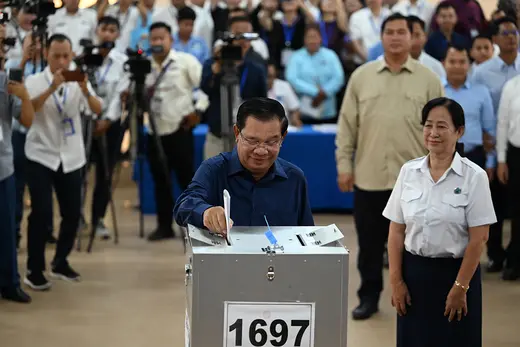Cambodia’s Elections: No Surprises, but an Uncertain Leadership Future
Prime Minister Hun Sen retained his grip on power after Cambodia’s stage-managed elections, with his party winning 120 out of 125 seats. But his long-awaited succession plan could create chaos and confusion in the country.
By experts and staff
- Published
Experts
![]() By Joshua KurlantzickSenior Fellow for Southeast Asia and South Asia
By Joshua KurlantzickSenior Fellow for Southeast Asia and South Asia
The Cambodian People’s Party (CPP) affiliated with longtime autocrat Hun Sen looks to have won nearly every seat in the National Assembly, the lower house of Parliament, to the surprise of no one. Yet, Cambodia faces significant political uncertainty going forward. Its young population is increasingly restive, and the state has grown more authoritarian. Hun Sen apparently wants to pass leadership to his son, Hun Manet, but powerful figures—and the public—could oppose Hun Manet’s accession.

Hun Sen has won convincingly. What happens next?
The longest-serving, non-royal leader in Asia remains in power. But seventy-year-old Hun Sen also has indicated that he now wants to step down and transfer power to his son, who served as commander of the army until he suspended his duties in that role to run for Parliament. Now that Hun Manet has won a seat, he can become prime minister once elected by a majority of the National Assembly and then inaugurated in front of constitutional monarch King Norodom Sihamoni. But few Asian leaders have achieved successful dynastic transitions, and Hun Manet has little of the legitimacy among Cambodia’s tycoons, powerful military men, and politicians that Hun Sen has amassed. It is also unclear whether Hun Manet would be willing to take harsh measures against opponents, as his ruthless father has done.
At the same time, Hun Sen has added to uncertainty surrounding the transition by failing to establish a clear succession plan. His health is reported to be worsening, but little information has been revealed, so Cambodia’s power brokers do not know whether or how a transition will happen.
If Hun Sen just steps down, he is likely to continue to wield massive power behind the scenes, undermining his son. He will remain president of the CPP, giving him enormous power. Many influential Cambodians are unenthusiastic about a dynastic succession and could add to the potential chaos when Hun Sen leaves the scene. Both Hun Sen and Hun Manet have likely promised top politicians and businesspeople and their children major promotions in the transition, as well as significant opportunities for graft. This could potentially assuage them but would also put them in position to complicate or usurp Hun Manet’s rule.
“Whatever Hun Manet does, the prime ministership will never have the same degree of authority as it did under Hun Sen,” writes longtime Cambodia expert David Hutt. “Either it becomes more consensus-based and competent, with ministries given more autonomy to make decisions and mistakes. Or the actual arbitrator of power becomes someone [Hun Sen] lurking behind the scenes,” which would not be a long-term solution to Cambodian governance.
As Sebastian Strangio, author of a biography of Hun Sen, has noted, Hun Sen has created a system in which he is indispensable to balancing all factions, making it tough for any successor to play that role.
Is there any role for a political opposition?
Prior to 2018, Hun Sen and the CPP allowed opposition parties to compete on Election Day even if those parties faced repression. In the 2013 parliamentary elections, the major opposition Cambodia National Rescue Party (CNRP) party nearly toppled the CPP, and it probably would have won if not for irregularities. Since then, Hun Sen has not tolerated a real election. The top court dissolved the CNRP before the 2018 elections, after which the new Candlelight Party sprung up in its place. But that opposition party was banned this year. Additionally, the government has held opposition coleader Kem Sokha under house arrest since March. The other top opposition leader, Sam Rainsy, faces life in prison if he returns to Cambodia from his exile in France.
When Hun Sen finally steps down, the possibility for regime in-fighting is clear—as is the chance of street protests and political change. In the past, allowing some degree of opposition politics and civil society provided an outlet for popular discontent, but now there is none. The possibility of intense protest looms in the transitional period, because corruption will likely rise as Hun Manet tries to keep all factions on his side and as popular frustration grows amid the dynastic transition. Indeed, it appears that Hun Manet will allow the children of many current ministers to simply take their parents’ positions as defense minister, interior minister, and other important posts, which will infuriate Cambodians.
Overall, Hun Sen has transformed Cambodia from a country with some political freedoms a decade ago to what is now one of the world’s most repressive states. He has shuttered basically every independent media outlet and many civil society groups. He has gone to war with the U.S. digital company Meta, which suspended him from Facebook for posting violent content, and has increasingly implemented tighter controls on the internet.
What has been the global response to the elections, and what are the prospects for change in Cambodia?
Prominent democracies including the United States have condemned the elections as unfree and unfair. But they have little leverage, as China stands behind Hun Sen with massive aid, trade, and rhetorical support, making sanctions on his regime even by leading democracies somewhat useless. A tenuous handover to another autocrat, along with even more corruption as Hun Manet tries to placate powerful people, could open the door for real political change. That could be the spark that unleashes Cambodians’ long-held anger at graft and intense repression, and possibly even restore the country’s path to democracy.
